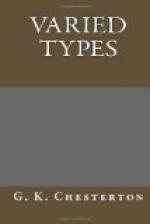There is one quality which is supreme and continuous in Scott which is little appreciated at present. One of the values we have really lost in recent fiction is the value of eloquence. The modern literary artist is compounded of almost every man except the orator. Yet Shakespeare and Scott are certainly alike in this, that they could both, if literature had failed, have earned a living as professional demagogues. The feudal heroes in the “Waverley Novels” retort upon each other with a passionate dignity, haughty and yet singularly human, which can hardly be paralleled in political eloquence except in “Julius Caesar.” With a certain fiery impartiality which stirs the blood, Scott distributes his noble orations equally among saints and villains. He may deny a villain every virtue or triumph, but he cannot endure to deny him a telling word; he will ruin a man, but he will not silence him. In truth, one of Scott’s most splendid traits is his difficulty, or rather incapacity, for despising any of his characters. He did not scorn the most revolting miscreant as the realist of to-day commonly scorns his own hero. Though his soul may be in rags, every man of Scott can speak like a king.
This quality, as I have said, is sadly to seek in the fiction of the passing hour. The realist would, of course, repudiate the bare idea of putting a bold and brilliant tongue in every man’s head, but even where the moment of the story naturally demands eloquence the eloquence seems frozen in the tap. Take any contemporary work of fiction and turn to the scene where the young Socialist denounces the millionaire, and then compare the stilted sociological lecture given by that self-sacrificing bore with the surging joy of words in Rob Roy’s declaration of himself, or Athelstane’s defiance of De Bracy. That ancient sea of human passion upon which high words and great phrases are the resplendent foam is just now at a low ebb. We have even gone the length of congratulating ourselves because we can see the mud and the monsters at the bottom.




